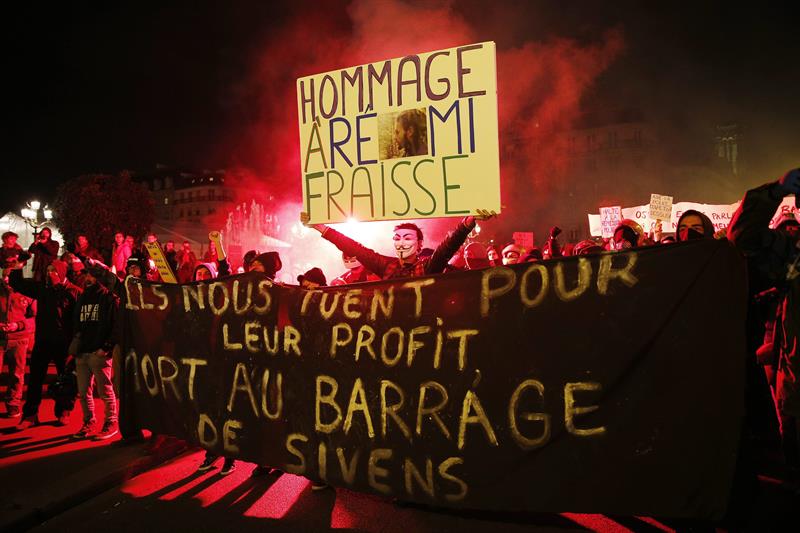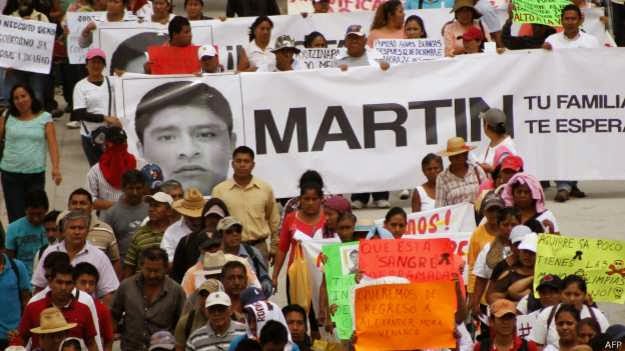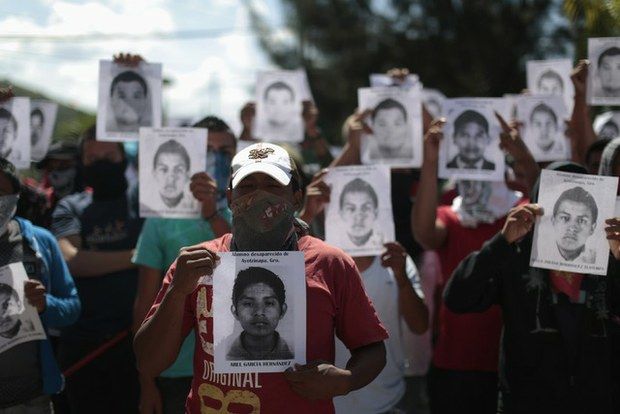Down with the government of corruption, unemployment and budget cuts
The Comisiones Obreras and the UGT must call a general strike now! Let us fight for a Revolutionary Constituent Assembly!
18/02/2013
Thursday, February 7, 2013
The most recent information about the Bárcenas case, published by El País exposes still further the real nature of the political regime born from the Transition and all its institutions.
In recent months, we workers and people have been seeing how, at the same time that they are launching the worst attacks since the dictatorship on our living and working conditions, unemployment has skyrocketed, over 6 million, almost two million jobless are without any income whatsoever, hundreds of thousands of families have been evicted and left in the streets … It comes to light how all the parties of the regime, the judiciary, different municipal and autonomous governments, now the central government itself and the Prime Minister and the monarchy itself, have been lining their pockets with their hands full.
The person who pays, also gives the orders
The documents published by El País show that the Partido Popular (PP) got more than 11 million euros “unofficially” in little more than a decade. Which decade? Exactly the one that coincides with the biggest real-estate bubble of our history, the one that, when it burst, opened up a crisis for which we are paying, as always, with unspeakable sufferings. In 1997 the Aznar government passed the Land Law, that opened the way to the most brutal housing speculation. Who were the main beneficiaries? The big construction companies and banking, that made a lot of money for themselves, both in contracts for public works, and in housing construction with increasingly higher prices that consumed wages and forced millions to have to go into debt.
And who are the main donors of that “box B”? Construction firms like Sacyr Vallehermoso, FCC, OHL... What a coincidence! That the banks are not among the donors does not change them into an “ungrateful” sector; simply, current legislation directly allows financial bribery, makes it easier. Santander, BBVA, las Cajas... were paying for favors with profitable credits, deferments and debt cancellations for the parties that were legislating “so well.” Let us say that there is a distribution of roles adjusted to the legal framework that they themselves are violating. Builders and businessmen were filling up box “B,” and the banks, box “A,” by other means, more legal, but just as corrupt.
And who were the ones sharing the loot? Apparently, Bárcenas made its own the maxim, “The one who distributes, takes away the best part.” It has 22 million in Switzerland, and it is not to be ruled out that it could have more in other fiscal paradises. But, failing to discover this, and if, in addition to the “papers” discovered, there are no other “C”,” “D,” or “Z” boxes, the “compensations” for such “good” politics were shared among the PP leadership, certainly including the current Prime Minister of the government, with packets amounting to 25,000 euros per year.
The entire regime is corrupt
No one is escaping. Urdangarín and the Infanta Cristina, the former Chief Justice of the Supreme Court, Juan Carlos Divar, the trial of the judiciary against Garzón because of the Gürtel case, the Bustos case or the Andalusian staff cutbacks (EREs) that implicate the PSOE, Gürtel and Bárcenas [implicating] the PP, the Palau case, the ITV contracts and the illegal financing of Unió and Convergencia... In all these cases, there is a common guest: big construction firms or public services contract firms. They are all an example of the close relationships of these parties and institutions with the employers. The Bársenas case is only the most obscene of them. And if any doubt remained that this is the hallmark of this “democracy for the rich,” one has only to see how most of the accused end up acquitted, and those who are convicted, are soon pardoned by the government, like the famous Servitje Roca, former Minister of Labor with Jordi Pujol, and his colleague Lorenzo Acuña. Who can be surprised then that all the laws and measures promoted by them will pursue the aim of saving businessmen from the crisis, at the expense of the workers and groups of the poor?
For a response with the working class in front: For a general strike against Rajoy’s government
The angry reaction was immediate. All day yesterday, it was the subject of conversation in the street, the workplaces, bars …. Are these the ones who want to reduce our wages? The ones who closed our health center? The ones who persecute you if you do an odd job under the table, because it is impossible to live on 450 euros.... The social networks gave a good account of it, and at the end of the afternoon, in several cities, thousands of people gathered in front of the headquarters of the PP. The biggest crowd was in Madrid, at the central headquarters on Génova Street, amply protected by the National Police, always defending the employers and their representatives. In Barcelona, some dozens remained camped out in Santa Jaume Square, and new gatherings are being organized for today, Friday, in all the cities.
Mobilizations that are emerging precisely in a situation of increasing social unrest, that is expressed every day in protest actions, strikes, street and highway blockades throughout the state, and that turned 2012 into the year with the most days on strike in recent times, with two calls for a general strike, the miners’ strike and the strike in public education... It is possible, then, that this crisis of the government and all the resources of the regime, this crisis from above, will make it easier for us to be able, from below, to strike with more force at the government that is passing the worst budget cuts since the dictatorship.
Meanwhile, the government and Rajoy remain silent, and the PP simply denies most, although several prominent people included on the Bárcenas list admit to having already received those amounts. Their extreme wing, with Aguirre as head, is studying its possibilities of prospering in the Spanish right wing. The PSOE is trying to take advantage of the opportunity, but it is difficult for it to soar, after having been the pioneer in the politics of austerity, and being involved up to its eyebrows in the whole quagmire of corruption. Even Arthur Mas wants to look after number one, as if he thus wanted to cover up his own cases of corruption or the 4 billion euros in cuts that he wants to load onto the shoulders of the workers and people of Catalonia in 2013.
In this fight against the government and the regime, it is necessary to demand and impose on the current bureaucratic leaderships of the majority unions, the CCOO and UGT, the end of their policy of containment and diversion. Up to now, Toxo and Méndez have been “managing” the workers’ unrest, in order to contain it to the maximum, allowing the attacks to go gradually, passing among all the firms. We must stop this policy and impose on them the immediate calling of a general strike against the government, as a starting point of a plan of struggle that will unify all the struggles that are going across the Spanish state: the hundreds of workers’ strikes against staff cutbacks, layoffs or cuts in conditions, the strikes by public sector workers, university and secondary school students, the mobilizations against corruption, the struggle for the right of self-determination of the Basques and Catalans... A plan of struggle that will be the beginning of a big process, that, with the working class at the forefront, will leave the Regime of 1978 and Spanish capitalism injured and demoralized.
For a Revolutionary Constituent Assembly
The slogan that has begun to circulate in these mobilizations is that of “Government resignation.” The Izquierda Unida, through Cayo Lara, came out to ask for the resignation of Rajoy and the calling of early elections. In the TVE breakfasts, Fernández Toxo asked for the same thing, if the information from El País were confirmed. But is a “regeneration” of this regime possible, perhaps? The investigatory commission against corruption that the IU is proposing in Parliament, by whom would it be formed? By the very parties that are behind the main scandals! It would be judge and jury, everything rolled into one. You don’t have to be a legal expert to realize that it would be a farce, as the many investigatory commissions of the Cortes, or, more recently, that of the fraudulent ERE’s [staff reductions] in the Junta of Andalusia, have been.
From Clase contra Clase, we support and are part of all these mobilizations that, undoubtedly, are weakening the government and the regime still more, from continuing to beat us up. We are joining the massive rejection of the PP Government with the perspective that the mobilization of workers and the poor will be able to overthrow this government, to bring it down. However, we cannot share the illusions in a possible “democratic regeneration,” that parties like the IU or the union bureaucracy consciously instill, in order to try to limit the objectives to a kind of “reform” of the regime of 1978 or a “new Transition.” It is not accidental that precisely two of the founders of this regime, the PCE and the leaders of the CCOO and the UGT, are the main spokespersons of this line. They have the experience of their exploit of 1978, diverting the workers’ and popular mobilization, in order to prevent a revolutionary process that could really resolve all the democratic problems and put an end to the big social problems. In this task, the PSOE will also be delighted, once more, to lend its services.
This regime is corrupt from the dome, the Crown, to the foundations, and no reform is possible. The only way of putting an end to this corrupt democracy, with the anti-worker offensive that we are suffering in the centers of work and public services, of resolving democratic questions, like the exercise of the right of self-determination of the nationalities, putting an end to the monarchy and all the inheritances from Franco’s rule … is precisely by overthrowing the Regime of 1978 through the workers’ and people’s mobilization, in order to impose a Revolutionary Constituent Assembly. That is, to open up a real, free and sovereign constituent process, in which we will be able to discuss and resolve all these questions, without any limitation, where it will be possible to discuss and approve the expropriation of the big capitalists, in order to put an end to problems like unemployment, poverty, and evictions, to imprison all the corrupt people without exception, the self-determination of Catalonia and the Basque country...
A process like that is not going to be convened, nor permitted, by the PSOE, nor the PP or the Crown. This crisis shows in a crude manner the validity of that maxim of the Communist Manifesto that “Now, the public power is coming to be, purely and simply, the administrative council that manages the collective interests of the bourgeois class.”
For that reason, we are far from any fantasy of democratic “regeneration” in the frameworks of this democracy for the rich, and opposed to those who are already asking for a constituent process that came from the current Cortes or the current government, that would only be a new “farce,” like the first Cortes of Suárez, where the current Constitution was cooked up. From Clase contra Clase, we believe that it is necessary to fight, in the prospect of overthrowing this government – and other “replacement” governments that could follow it – so that the regime falls with it, and a government of the workers and the people is imposed, the only one capable of convoking a really democratic and sovereign Constituent Assembly.


![Declaration of the Movimiento de los Trabajadores Socialistas [MTS] facing the brutal murder and disappearance of the normalistas students of Ayotzinapa](http://www.ft-ci.org/IMG/arton8590.jpg?1687978277)

















